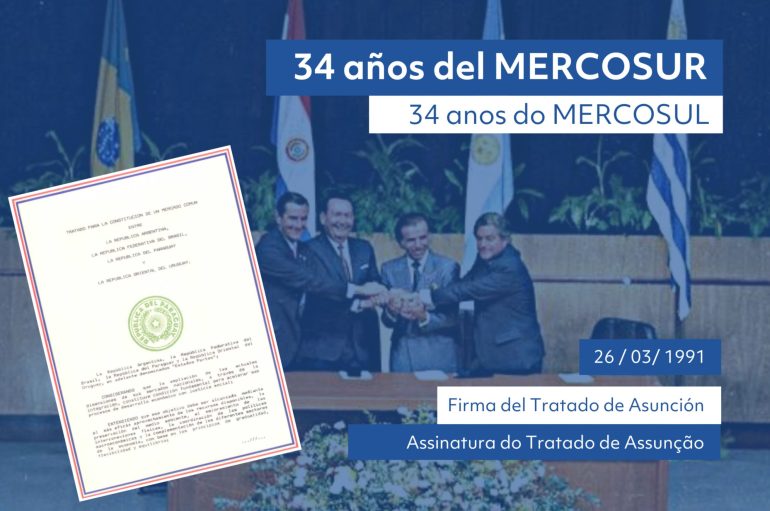The Southern Common Market (Mercosur) celebrates 34 years of its creation today. It is one of the most important regional integration blocs in Latin America. On March 26, 1991, the presidents of Argentina, Brazil, Paraguay, and Uruguay signed a treaty in the Paraguayan capital, hence the name “Treaty of Asunción.”
The bloc is open to accession by other member states of the Latin American Integration Association. The Protocol of Accession of the Plurinational State of Bolivia entered into force in August 2024, allowing up to four years to incorporate the bloc’s regulatory framework.
Argentina currently holds the Pro Tempore Presidency in accordance with the Ouro Preto Protocol, which establishes that the Presidency must be held by the States Parties, rotating and in alphabetical order, for six months.
Mercosur is described as “an open and dynamic, intergovernmental process, where each State Party has one vote, and decisions must be made by consensus and with the participation of all”.
It has three decision-making bodies: the Common Market Council (CMC), the highest body of MERCOSUR, which politically directs the integration process; the Common Market Group (GMC), which oversees the day-to-day functioning of the bloc; and the Trade Commission (CCM), responsible for administering common trade policy instruments.
Over its more than three decades of existence, Mercosur has created permanent bodies to better implement its regional policies. The first permanent body, based in Montevideo, is the Commission of Permanent Representatives of Mercosur (CRPM); Montevideo is also home to the Mercosur Secretariat (SM) and the Mercosur Parliament (Parlasur); the MERCOSUR Social Institute (ISM) and the Permanent Review Tribunal (TPR), both based in Asunción; and the Institute of Public Policies on Human Rights (IPPDH), in Buenos Aires.
During this period, the MERCOSUR Structural Convergence Fund (FOCEM) was also created, through which nearly 60 projects submitted by the Member States have been financed through non-reimbursable resources.
Mercosur has a Citizenship Statute, a dynamic instrument that compiles rights and benefits for nationals and permanent residents of the Member States, as established in the bloc’s current legal framework.


